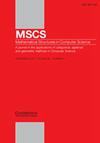Proof-relevance in Bishop-style constructive mathematics
IF 0.9
4区 计算机科学
Q4 COMPUTER SCIENCE, THEORY & METHODS
引用次数: 4
Abstract
Abstract Bishop’s presentation of his informal system of constructive mathematics BISH was on purpose closer to the proof-irrelevance of classical mathematics, although a form of proof-relevance was evident in the use of several notions of moduli (of convergence, of uniform continuity, of uniform differentiability, etc.). Focusing on membership and equality conditions for sets given by appropriate existential formulas, we define certain families of proof sets that provide a BHK-interpretation of formulas that correspond to the standard atomic formulas of a first-order theory, within Bishop set theory $(\mathrm{BST})$ , our minimal extension of Bishop’s theory of sets. With the machinery of the general theory of families of sets, this BHK-interpretation within BST is extended to complex formulas. Consequently, we can associate to many formulas $\phi$ of BISH a set ${\texttt{Prf}}(\phi)$ of “proofs” or witnesses of $\phi$ . Abstracting from several examples of totalities in BISH, we define the notion of a set with a proof-relevant equality, and of a Martin-Löf set, a special case of the former, the equality of which corresponds to the identity type of a type in intensional Martin-Löf type theory $(\mathrm{MLTT})$ . Through the concepts and results of BST notions and facts of MLTT and its extensions (either with the axiom of function extensionality or with Vooevodsky’s axiom of univalence) can be translated into BISH. While Bishop’s theory of sets is standardly understood through its translation to MLTT, our development of BST offers a partial translation in the converse direction.毕晓普式构造数学中的证明相关性
毕晓普提出的构造数学BISH的非正式体系有意接近于经典数学的证明无关性,尽管证明相关性的一种形式在模的几个概念(收敛性、一致连续性、一致可微性等)的使用中是明显的,我们在毕晓普集合论$(\mathrm{BST})$中定义了某些证明集族,这些证明集族提供了对应于一阶理论的标准原子公式的公式的BHK解释,毕晓普集论$是毕晓普的集合论的最小扩展。利用集合族的一般理论,将BST中的BHK解释推广到复杂公式中。因此,我们可以将$\phi$的“证明”或见证的集合${\texttt{Prf}}(\phi)$关联到BISH的许多公式$\phi$。从BISH中的几个总数例子中抽象出,我们定义了具有证明相关等式的集合的概念,以及Martin-Löf集合的概念(前者的特例),其等式对应于内涵Martin-Löf类型理论$(\mathrm{MLTT})$中类型的同一类型。通过BST的概念和结果,MLTT及其扩展(无论是用函数可拓性公理还是用Vooevodsky的单价公理)的概念和事实都可以转化为BISH。虽然毕晓普的集合理论通过翻译成MLTT而得到了标准的理解,但我们对BST的发展提供了相反方向的部分翻译。
本文章由计算机程序翻译,如有差异,请以英文原文为准。
求助全文
约1分钟内获得全文
求助全文
来源期刊

Mathematical Structures in Computer Science
工程技术-计算机:理论方法
CiteScore
1.50
自引率
0.00%
发文量
30
审稿时长
12 months
期刊介绍:
Mathematical Structures in Computer Science is a journal of theoretical computer science which focuses on the application of ideas from the structural side of mathematics and mathematical logic to computer science. The journal aims to bridge the gap between theoretical contributions and software design, publishing original papers of a high standard and broad surveys with original perspectives in all areas of computing, provided that ideas or results from logic, algebra, geometry, category theory or other areas of logic and mathematics form a basis for the work. The journal welcomes applications to computing based on the use of specific mathematical structures (e.g. topological and order-theoretic structures) as well as on proof-theoretic notions or results.
 求助内容:
求助内容: 应助结果提醒方式:
应助结果提醒方式:


